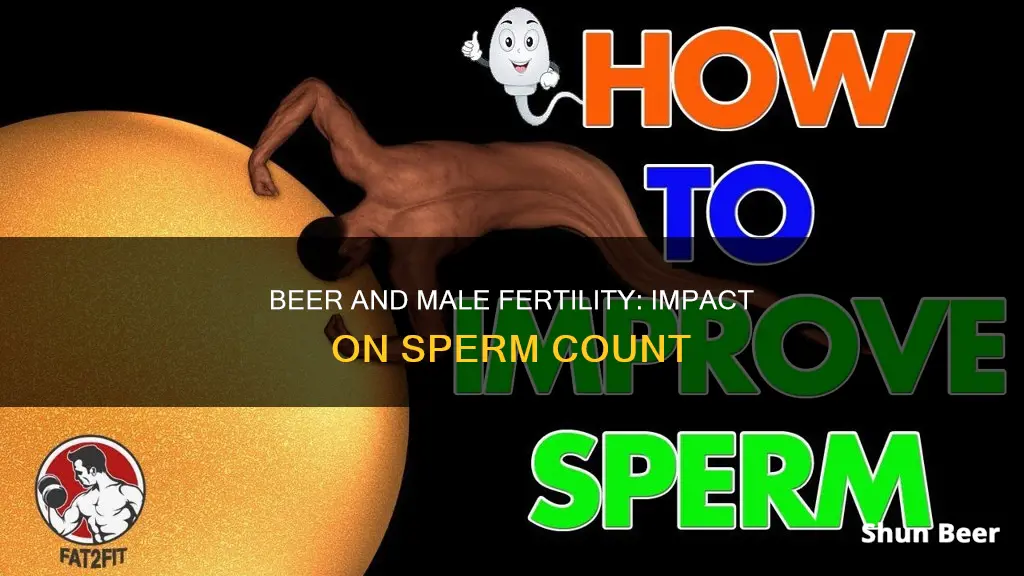
Alcohol consumption has been linked to sexual dysfunction in men, with research suggesting that it can reduce sperm count and quality. Heavy drinking is particularly harmful, with studies showing that it can lower testosterone production, reduce libido, cause erectile dysfunction, and shrink the testes.
A 2014 study of over 1200 Danish men found that those who drank five units of alcohol per week had lower sperm counts and quality than those who did not drink alcohol. Another review of 15 studies concluded that daily drinking is associated with reduced semen volume and morphology.
The effects of alcohol on sperm count are reversible, with one study showing that it took three months for healthy sperm production to return after alcohol consumption stopped.
| Characteristics | Values |
|---|---|
| Impact on male fertility | Reduced testosterone levels, sperm count, and libido; early ejaculation; shrunken testes |
| Impact on female fertility | Irregular periods; reduced chance of pregnancy; increased chance of miscarriage, stillbirth, and health problems for the baby |
| Recommended alcohol consumption for men | 1-5 units per week |
| Recommended alcohol consumption for women | 0 units per week |
What You'll Learn

Alcohol can reduce testosterone levels and sperm count
Alcohol can negatively impact male fertility by reducing testosterone levels and sperm count.
Research suggests that even moderate alcohol consumption can affect male fertility. A study of over 1200 Danish men found that men who drank five units of alcohol per week had lower sperm counts and lower sperm quality than men who did not drink alcohol. Another study of 8344 healthy men from Europe and the US found no association between low/moderate alcohol consumption and semen quality. However, a meta-analysis of 18 cross-sectional studies concluded that daily alcohol consumption negatively impacts semen volume and morphology.
The negative effects of alcohol on male fertility are mainly due to the generation of oxidative stress during ethanol metabolism, which damages DNA and alters gene expression. Ethanol consumption can also lead to oxidative damage in the epididymis, impairing sperm function. Additionally, ethanol can interfere with testosterone synthesis, leading to reduced libido and erectile dysfunction.
Chronic alcohol consumption is also associated with increased serum prolactin levels, which can cause hypogonadism, reduced sperm production, impotence, and gynecomastia. Furthermore, alcohol abuse can lead to liver dysfunction, resulting in hormonal disturbances due to the impaired metabolism of estrogens.
The impact of alcohol on male fertility is not limited to sperm quality and testosterone levels. Heavy drinking can also cause sexual dysfunction, including issues with arousal, desire, and ejaculation, further hindering the chances of conception.
It is important to note that the effects of alcohol on male fertility are reversible. One study showed that it took three months for healthy sperm production to return after alcohol consumption was stopped.
CBD Oil and Beer: Is It Safe?
You may want to see also

It can cause impotence or infertility
Alcohol consumption can lead to impotence or infertility in men. Here's how:
Impacts on the Hypothalamic-Pituitary-Gonadal (HPG) Axis
Alcohol consumption can affect the HPG axis, which regulates the secretion of reproductive hormones such as testosterone. While some studies have reported increased levels of follicle-stimulating hormone (FSH), luteinizing hormone (LH), and oestrogen in heavy drinkers, others have found lower levels of FSH and LH in alcoholic men. Additionally, chronic alcohol intake can increase serum prolactin levels, leading to hypogonadism, reduced sperm production, impotence, and gynecomastia.
Alterations in Testicular Function and Semen Quality
Alcohol consumption can affect testicular function and semen quality. Animal studies have shown that ethanol-fed mice had compromised testicular integrity and altered prostate weight, resulting in decreased sperm concentration and increased abnormal sperm morphology. Human studies have also found a correlation between alcohol consumption and reduced sperm concentration, motility, and normal morphology. Additionally, alcohol can cause defects in chromatin condensation and increase sperm DNA fragmentation.
Induction of Cellular Damage and Oxidative Stress
Ethanol consumption can induce cellular damage through multiple interconnected mechanisms, including the establishment of an inflammatory and oxidative environment. This can lead to genotoxicity and enhanced apoptotic rates, ultimately causing cell death. Ethanol metabolism increases the levels of reactive oxygen species (ROS), which can damage DNA and proteins and contribute to several pathological conditions.
Effects on Reproductive Hormones and Sexual Dysfunction
Heavy drinking can affect reproductive hormones and sexual function in men. It can reduce testosterone levels, cause early ejaculation, and shrink the testes, leading to impotence or infertility. Additionally, alcohol abuse and acute intoxication are associated with sexual dysfunction, including issues with arousal, desire, erectile dysfunction, and ejaculatory dysfunction, all of which can impact fertility.
Transgenerational Effects on Offspring
Paternal alcohol consumption can also have transgenerational effects on offspring. Animal studies have shown that paternal alcohol exposure can lead to hormonal and nervous system anomalies in the offspring, including reduced expression of nerve growth factor (NGF) in the brain and shorter anogenital distance, a marker of male fertility. Additionally, paternal alcoholism before conception has been associated with limited offspring growth and decreased placental efficiency.
Beer and Seizures: Is There a Link?
You may want to see also

It can lead to early ejaculation or decreased ejaculation
Alcohol consumption can lead to early ejaculation or decreased ejaculation. This is due to the negative impact of alcohol on male fertility, particularly sperm quality and count. Research suggests that even moderate weekly alcohol consumption can lower sperm quality. A study of 1,221 Danish men found that those who drank five units of alcohol per week had lower sperm counts and quality. The more alcohol consumed, the more likely they were to have lower sperm counts.
Heavy drinking has been linked to lower testosterone levels, which can cause a reduction in sperm production. Alcohol can also affect the testes, leading to impotence or infertility. Additionally, liver disease caused by excessive drinking can impact sperm production.
The effects of alcohol on sperm quality and fertility are reversible. One study showed that it took three months for healthy sperm production to return after alcohol consumption stopped. However, it is recommended that men reduce their alcohol intake to improve their reproductive health and overall wellbeing.
Heavy drinking can also affect sexual performance, leading to issues with arousal, desire, and erectile and ejaculatory dysfunction, which may further contribute to difficulties in conceiving.
Mixing Milk and Beer: A Safe Drinking Combination?
You may want to see also

It can change the shape, size, and movement of healthy sperm
Alcohol consumption can have a detrimental impact on male fertility, affecting the shape, size, and movement of healthy sperm. Here's how:
Impact on Testosterone and Hormone LevelsHeavy drinking can lower testosterone levels in men, which is crucial for sperm production. Alcohol can also interfere with the production of other reproductive hormones, such as follicle-stimulating hormone and luteinizing hormone, while raising estrogen levels. This hormonal imbalance can lead to reduced sperm production and even impotence.
Alterations in Sperm Quality and Morphology
Excessive alcohol intake has been linked to a decrease in sperm count and quality. Studies have shown that men who consume higher amounts of alcohol tend to have lower sperm counts and a higher proportion of abnormal sperm. Specifically, alcohol can affect the shape and size of sperm, making them less effective in fertilizing an egg.
Impaired Sperm Motility
In addition to changes in sperm morphology, alcohol consumption can also impact sperm motility, or their ability to move effectively. This is crucial for sperm to reach and fertilize an egg. Alcohol can hinder the normal movement of sperm, further reducing the chances of conception.
Sexual Dysfunction and Erectile DysfunctionHeavy drinking is associated with sexual dysfunction, including issues with arousal, desire, and erectile function. These problems can create difficulties in achieving conception, even if sperm count and quality are within normal ranges.
Liver Dysfunction and Metabolic DisturbancesAlcohol abuse can lead to liver dysfunction, which can have indirect effects on sperm health. The liver plays a vital role in metabolizing hormones, and alcohol-induced liver damage can disrupt this process, leading to hormonal imbalances that affect sperm production and function.
Genetic and Epigenetic ChangesChronic alcohol consumption has been linked to genetic and epigenetic changes in sperm. These alterations can affect the expression of genes involved in sperm function, apoptosis (programmed cell death), and DNA methylation patterns. These changes may have transgenerational effects, impacting the health and development of offspring.
While the exact mechanisms are still being elucidated, the existing evidence suggests that alcohol consumption can indeed alter the shape, size, and movement of healthy sperm, negatively impacting male fertility. Reducing alcohol intake or abstaining from alcohol can help mitigate these adverse effects and improve sperm health.
Mixing Beer and Red Wine: A Good Idea?
You may want to see also

It can lead to liver disease, which can cause hormonal disturbances
Alcohol abuse can lead to liver disease, which can cause hormonal disturbances. Ethanol, or ethyl alcohol, is primarily metabolised by the liver, which can result in the synthesis of acetaldehyde and acetate, which are toxic and carcinogenic by-products. Acetate can be metabolised into acetyl-CoA, a key molecule in lipid and cholesterol synthesis. However, it can also be converted into carbon dioxide, fatty acids, ketones, or cholesterol, depending on nutritional, energetic, and hormonal status.
Chronic alcohol intake can lead to liver dysfunction, impairing the liver's ability to metabolise oestrogens. This can result in hormonal disturbances and negatively impact male fertility. Alcohol abuse can also increase serum prolactin levels, leading to hypogonadism, reduced sperm production, impotence, and gynecomastia.
In addition, alcohol consumption can alter the expression of enzymes involved in testosterone synthesis, such as ADH and ALDH. These enzymes play a role in ethanol metabolism, and specific genetic variants of these enzymes have been associated with alcohol tolerance and the development of alcohol-use disorder.
Furthermore, alcohol consumption can affect the hypothalamic-pituitary-gonadal (HPG) axis, which regulates reproductive hormones. Alcohol can suppress the release of gonadotropin-releasing hormone (GnRH) from the hypothalamus, leading to reduced levels of luteinising hormone (LH) and follicle-stimulating hormone (FSH). This, in turn, can affect testosterone levels and spermatogenesis.
Chronic alcohol intake can also increase oxidative stress and inflammation, which can impact semen quality and DNA integrity. Alcohol metabolism enhances the production of reactive oxygen species (ROS), which can damage DNA and impact male fertility.
Overall, alcohol abuse and chronic consumption can lead to liver disease and hormonal disturbances, affecting testosterone levels, sperm production, and semen quality. These factors can contribute to reduced male fertility and increase the risk of infertility.
Beer and Milk: A Dangerous Mix?
You may want to see also
Frequently asked questions
Research shows that drinking beer can reduce sperm count. However, the extent of the reduction depends on the amount of beer consumed. One study found that men who drank five units of alcohol per week had lower sperm counts and quality compared to men who did not drink alcohol. Another study found that men who drank 40 units of alcohol per week had a 33% reduction in sperm concentration.
Yes, drinking beer can affect fertility in both men and women. In men, heavy drinking can lower testosterone production and reduce libido, making it difficult to get an erection. In women, alcohol can affect hormones and ovulation, making it harder to conceive.
Heavy drinking is typically defined as consuming two to four standard drinks per day on average, or more than four standard drinks on one occasion.
In addition to reducing sperm count and quality, heavy drinking can also cause sexual dysfunction, including issues with arousal and desire, as well as erectile and ejaculatory dysfunction.
Heavy drinking in women can lead to heavy or irregular periods and infertility. If a woman drinks heavily during pregnancy, it can increase the risk of miscarriage, stillbirth, premature birth, low birth weight, and fetal alcohol spectrum disorder (FASD).







